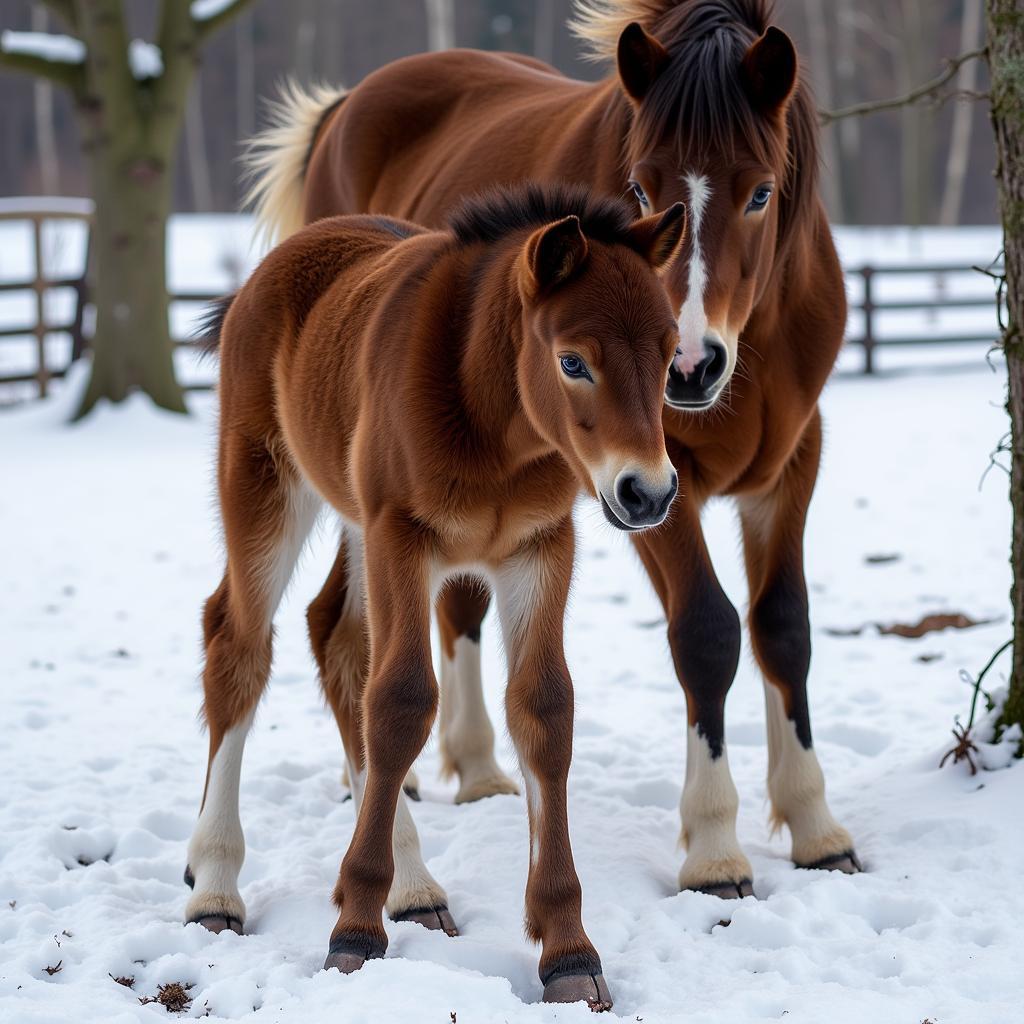The term “February Son Horse” often sparks curiosity among horse enthusiasts. While not a formally recognized breed or designation, it’s linked to folklore and traditional breeding practices. This article dives into the origins of this term, exploring the myths and realities surrounding February-born foals, and provides essential care tips for horses born during this time.  February Son Horse in Winter Pasture
February Son Horse in Winter Pasture
Decoding the “February Son Horse” Myth
Historically, “February son horse” likely referred to foals born early in the breeding season, often during harsh winter conditions. These foals were sometimes considered hardier and more resilient. However, there’s no scientific basis for this belief. A foal’s health and resilience depend more on genetics, nutrition, and proper care than birth month. The belief likely stemmed from the observation that foals surviving challenging early months demonstrated inherent strength. Many breeders aimed for early foals, hoping for a head start on training and showing.
While the term “February son horse” may carry a sense of mystique, it’s crucial to prioritize evidence-based care practices.
Essential Care for February-Born Foals
Foals born in February require special attention due to potential weather challenges. Providing adequate shelter from cold, wind, and rain is paramount. A warm, dry stall with ample bedding is crucial.
- Nutrition: Ensuring the mare receives a balanced diet is essential for milk production and the foal’s growth. Consult with a veterinarian about appropriate supplements for both mare and foal.
- Warmth: Consider using foal blankets in extreme cold. Monitor the foal’s body temperature closely to avoid hypothermia.
- Hygiene: Maintaining a clean, dry environment in the stall helps prevent infections. Regularly clean and disinfect the stall, paying special attention to areas where the foal urinates and defecates.
Managing Health Concerns in February Foals
February foals can be more susceptible to certain health issues due to the colder climate. Respiratory infections are a common concern.
- Vaccination: Consult your veterinarian to establish a vaccination schedule tailored to your foal’s needs and the prevalent diseases in your area.
- Parasite control: Regular deworming is crucial, as parasites can thrive even in colder months.
- Hoof care: Regular hoof trimming is important to maintain proper hoof balance and prevent issues later in life.
“A strong foundation of early care is essential for a February foal’s lifelong well-being,” advises Dr. Amelia Shepherd, DVM, specializing in equine neonatology. “Proper nutrition, hygiene, and vigilant monitoring are key to ensuring a healthy start.”
Navigating the First Few Months
The first few months are critical for a February foal’s development. Gradual introduction to turnout in a safe, sheltered area is beneficial as weather permits. Socialization with other horses, under careful supervision, helps develop essential social skills. Begin handling the foal early with gentle, positive interactions to build trust and prepare for future training.
Preparing for the Weaning Process
The weaning process can be stressful for both mare and foal. Planning ahead and implementing a gradual weaning schedule minimizes stress and promotes a smoother transition.
“Weaning should be a gradual process, allowing both mare and foal to adjust physically and emotionally,” recommends Dr. Samuel Evans, PhD, Equine Behaviorist. “Minimizing stress during this period contributes to the foal’s long-term well-being.”
Conclusion
While “February son horse” holds a place in horse lore, a foal’s health and development hinge on appropriate care and management. By understanding the specific needs of February-born foals and implementing best practices, horse owners can ensure these youngsters thrive and reach their full potential. Remember that seeking advice from a qualified veterinarian and farrier is crucial for tailoring a care plan to your foal’s individual needs. Understanding the myths and focusing on practical care will help your February foal flourish.
FAQs
- Is a “February son horse” a specific breed? No, it’s a traditional term, not a recognized breed.
- Are February foals inherently stronger? No, resilience depends on various factors, not just birth month.
- What are the main care concerns for February foals? Warmth, nutrition, and hygiene are crucial.
- When should I start handling a February foal? Gentle handling can begin soon after birth.
- What’s the best way to wean a February foal? Implement a gradual, low-stress weaning process.
horse expo sacramento california
For any assistance, please contact us at Phone Number: 0772127271, Email: [email protected], or visit us at QGM2+WX2, Vị Trung, Vị Thuỷ, Hậu Giang, Vietnam. We have a 24/7 customer service team.